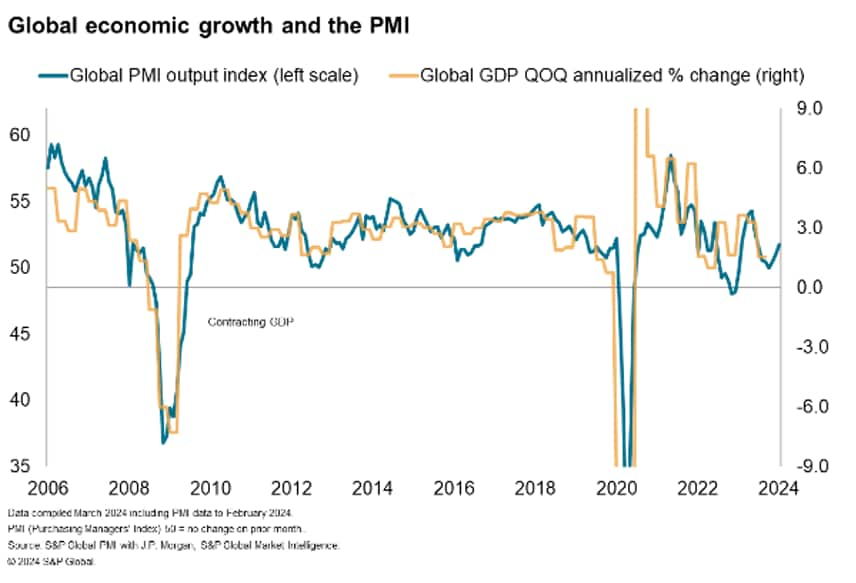March 12, 2024
The global economic expansion accelerated for a fourth straight month in February as both manufacturing output and services activity grew at faster rates. This was accompanied by rising selling price inflation, however, driven by the service sector.
The J.P.Morgan Global PMI Composite Output Index – produced by S&P Global – rose to 52.1 in February, up from 51.8 in January. The headline PMI continued to sit below the survey’s long-run average of 53.2 and is consistent with an annualized quarterly global GDP growth of approximately 2%, which remains well below the pre-pandemic ten-year average of 3.0%. That said, the latest PMI reading signalled the fastest global expansion since June 2023, further helping to allay concerns of a global recession.
The latest improvement was also broad-based as both manufacturing and service sector growth accelerated in February, with the number of sub-sectors expanding now at a ten-month high. Manufacturing output notably rose for a second straight month, with a renewed rise in goods new orders driving the latest expansion in production. A revival in consumer demand, an easing of the recent destocking trend and further inventory building were observed as key reasons for the improvement in manufacturing sector conditions. This was while the impact from the Red Sea disruptions remained limited upon supply chains in February, thereby enabling the growth in production to accelerate.
Services activity meanwhile expanded at an even more pronounced rate in February, supported by looser financial conditions, reduced recession fears and robust labour markets.
Selling price inflation rose in tandem with the growth in activity, however, and remained elevated by pre-pandemic standards. This was especially so in the service sector. As such, we will be closely watching the next release of flash PMI data on March 21 for the inflation trajectory given the uncertainty this continues to pose to rate cut plans around the world.
Source: S&P GLOBAL – by Jingyi Pan
Legal Notice: The information in this article is intended for information purposes only. It is not intended for professional information purposes specific to a person or an institution. Every institution has different requirements because of its own circumstances even though they bear a resemblance to each other. Consequently, it is your interest to consult on an expert before taking a decision based on information stated in this article and putting into practice. Neither Karen Audit nor related person or institutions are not responsible for any damages or losses that might occur in consequence of the use of the information in this article by private or formal, real or legal person and institutions.







